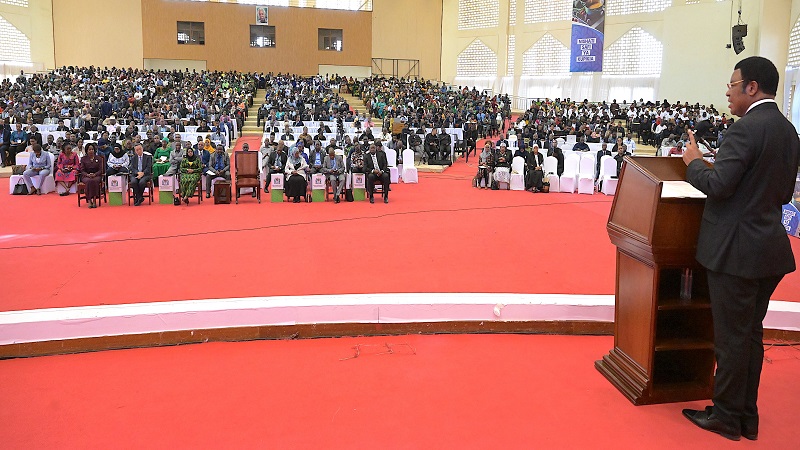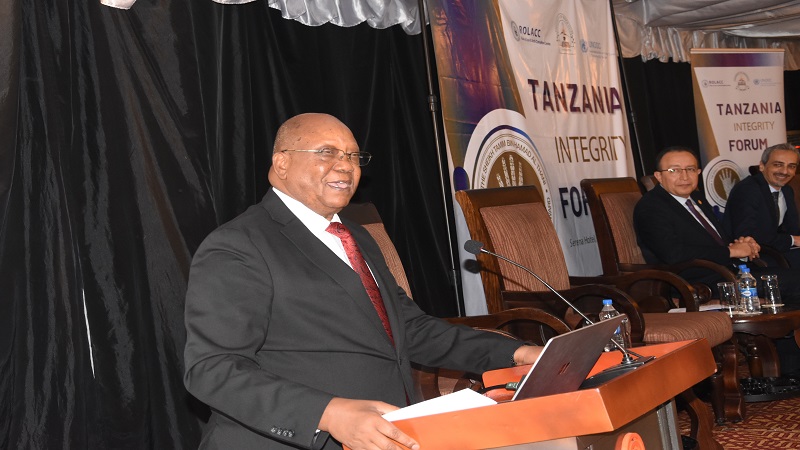Tanzanian young women urge President to reject anti-corruption law amendments

IN Tanzania, women, girls, and children face various forms of gender-based violence (GBV), including discrimination, denial of basic services as well as physical and psychological abuse from their communities.
One of the significant challenges impeding women’s and girls’ progress is sextortion or sexual corruption, which hampers their quest for employment.
Recently, the government proposed amendments to the Prevention and Combating of Corruption (PCCB) Act. The proposed changes include replacing Section 25 with a new Section 10(b), which would criminalise not only those who demand sexual favours but also those who offer them.
The bill, which will be debated in upcoming parliamentary sessions, has faced considerable criticism from women's rights activists, who argue that it could exacerbate sexual corruption and adversely impact women and girls.
This has greatly been criticized by Tanzania women’s rights activists saying that the new changes will further promote sexual corruption which in the end affects women and girls.
The current Act concerns only the person who demands sexual favours or any other favours.
The proposed sub-section reads: “9A person who) promises, gives, or offers sexual favour or any other favour to a person who is in a position of power or authority, to influence him to exercise his authority in his favour in giving employment, promotion, a right, privilege or any preferential treatment commits an offence and on conviction shall be liable to a fine of not less than two million shillings but not exceeding ten million shillings or to imprisonment for a term of not less than five years but not exceeding ten years or to both.”
Addressing reporters in Dar es Salam on Thursday, some young women leaders from various non-governmental organisations (NGOs) appealed to the government to drop its proposal that both the perpetrator and the victim of sextortion should face sexual corruption charges, noting that the proposition fails to consider the issue of power that is central to the crime.
They urged President Samia Suluhu Hassan to reject the proposed amendments to Act, if Parliament approves them.
Hellen Sizya, leader of the young women leaders highlighted that corruption affects various aspects of life, including at home, in universities, workplaces, the arts, sports and political parties.
Sizya pointed out that research by PCCB in collaboration with anti-sexual corruption coalitions, underscores the gravity of the issue and young women are acutely aware of its implications.
Sara Beda, head of communications at Msichana Initiative urged legislators to recognise that young people are the majority and are disproportionately affected, urging them to reject the proposed section or else the youth will conduct hard decisions in the upcoming elections.
‘Our Parliament, which represents us, should not pass these amendments. The role of Parliament is to create laws that protect rights, not to create laws that protect criminals,” Beda said.
She also called on Tanzanians, particularly human rights activists focusing on women and girls, to strongly oppose the inclusion of Section 10(b) in the bill.
“The law offers a clear distinction between sexual corruption and other types of corruption. Sexual corruption involves those in positions of power exploiting their authority to demand sex as a condition for providing victims with their rightful benefits and preferential treatment,” she explained.
According to her, this section is unnecessary and dangerous, urging the government to scrap it from the proposed legislation.
“We actually thought that if there were to be any amendments to the law, then they would be about making the punishment against the perpetrators of sextortion harsher and stricter,” she remarked.
On Wednesday, the Anti-Sextortion Coalition in Tanzania also called for an amendment of the proposed PCCB Act section 10(b) for violating women's rights.
The coalition that engages approximately 200 organisations from the community to the national level was involved in the feasibility analysis of the initial proposals for the amendment of the law and gave its recommendations to the PCCB.
Mary Ndaro noted that the addition of article 10(b) allows a person to offer sexual favour or any other favour to another person in a position of power to exercise their authority in giving employment, promotion, or any preferential treatment.
Also, upon conviction, an offender shall be liable to a fine of not less than 2m/- but not exceeding 10m/- or to imprisonment for a term not less than five years but not exceeding ten years or both. The coalition is of the view that this penalty is lenient.
“Despite awareness of sextortion and its effects on vulnerable groups, we are shocked by the continued neglect of our recommendations: to delete additional article 25(b) which deprives the victim of their rights, and instead add article 10(b) that justifies continuing the abuse of power by condemning the victim of sexual corruption as a method to silence them and trivialize the fight against sexual corruption is not acceptable.”
She also highlighted that if the Parliament ignores their demands, they will appeal to President Samia not to accept the changes based on their implications for the nation’s growth and development.
According to her, sexual corruption has effects on the victim including; robbing their dignity, deprives opportunities to develop their talents, and giving privileged positions to those with meritorious qualities.
Sexual corruption affects the national economy to a great extent, where it causes misuse of human resources, thus weakening efforts to fight poverty; it undermines the nation's dignity by turning rights into privileges contrary to work ethics and international and regional laws prohibiting acts of sexual corruption.
Dr Ave Maria Semakafu, a coalition member, said sextortion awareness and its effects on university students have helped them attain their rights, arguing that passing the bill would automatically deprive them of their rights.
Top Headlines
© 2024 IPPMEDIA.COM. ALL RIGHTS RESERVED

























